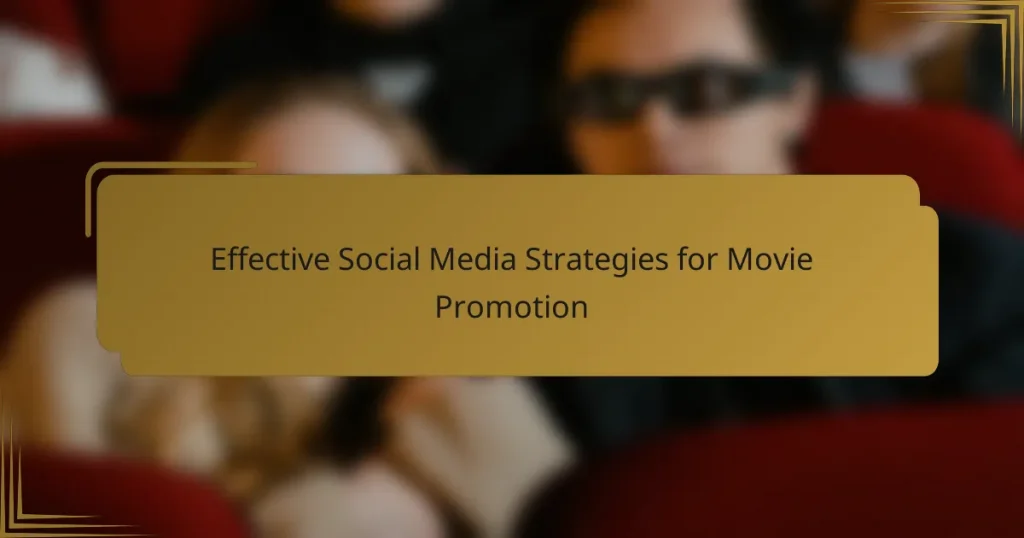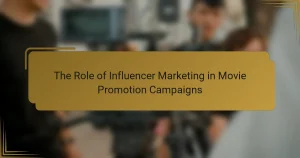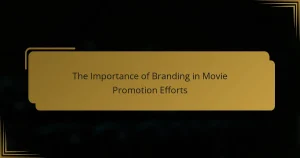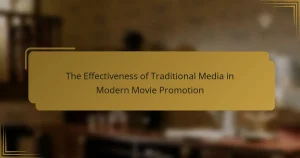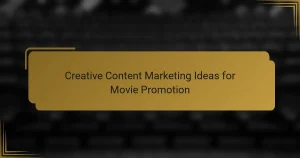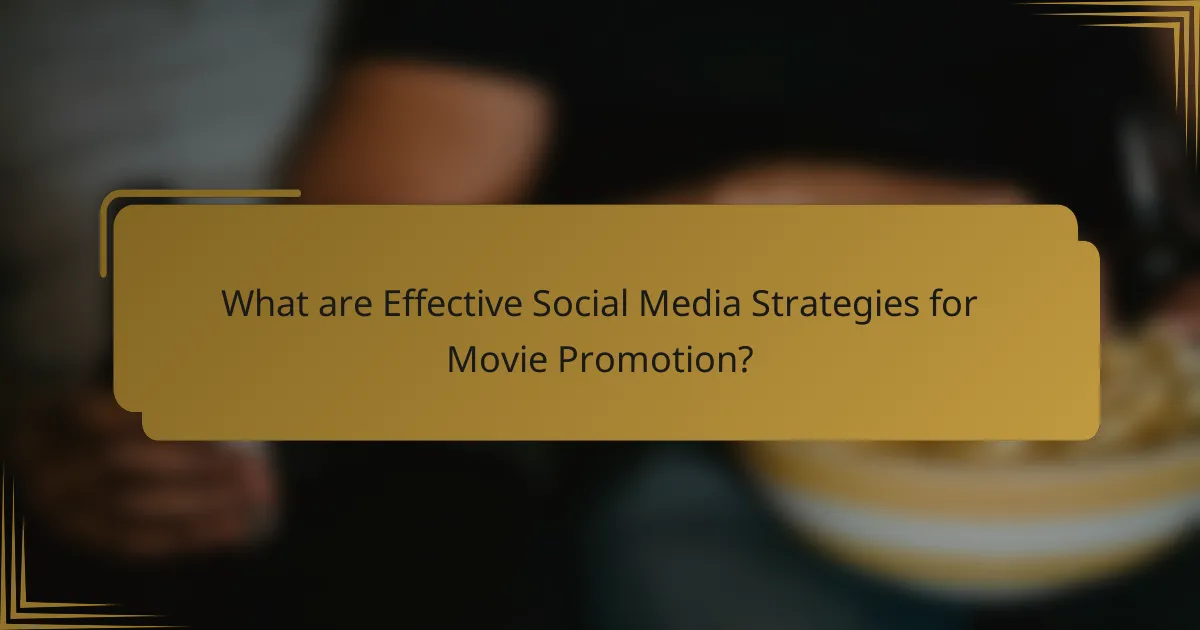
What are Effective Social Media Strategies for Movie Promotion?
Effective social media strategies for movie promotion include targeted advertising, engaging content, and influencer partnerships. Targeted advertising allows studios to reach specific demographics. For example, Facebook ads can be tailored based on user interests and behaviors. Engaging content, such as behind-the-scenes footage and interactive posts, can boost audience interest. A study by the American Film Institute found that engaging content increases shareability by 60%. Influencer partnerships leverage the reach of popular social media figures. Collaborating with influencers can expand the movie’s visibility to their followers. Additionally, utilizing platforms like Instagram and TikTok can attract younger audiences. According to a report by Statista, 69% of teens use TikTok regularly. These strategies collectively enhance audience engagement and drive ticket sales.
How can social media enhance movie promotion efforts?
Social media enhances movie promotion efforts by providing a platform for direct audience engagement. It allows filmmakers to share trailers, behind-the-scenes content, and exclusive interviews. This content generates excitement and anticipation among potential viewers. Social media also facilitates targeted advertising to specific demographics based on user interests. According to a study by the Pew Research Center, 69% of adults use social media, making it an effective channel for reaching a wide audience. Additionally, user-generated content, such as fan art and reviews, creates organic buzz around a movie. This word-of-mouth promotion can significantly impact box office performance. Social media campaigns can also leverage influencers to reach niche audiences, increasing visibility. Overall, social media serves as a powerful tool for amplifying movie marketing efforts.
What are the key platforms for movie promotion on social media?
The key platforms for movie promotion on social media are Facebook, Instagram, Twitter, YouTube, and TikTok. Facebook allows targeted advertising and event promotion to reach specific demographics. Instagram focuses on visual content, making it ideal for trailers and behind-the-scenes images. Twitter facilitates real-time engagement with fans and trending topics. YouTube serves as a platform for trailers and video content, reaching a wide audience. TikTok engages younger viewers with short, creative videos that can go viral. Each platform has unique features that enhance movie marketing strategies.
How do audience demographics influence platform choice?
Audience demographics significantly influence platform choice. Different age groups, genders, and interests gravitate towards specific platforms. For example, younger audiences prefer TikTok and Instagram. In contrast, older demographics may favor Facebook. Gender can also play a role; women are more active on Pinterest. Data shows that 71% of teenagers use Instagram regularly. This preference impacts how movies are promoted on these platforms. Understanding these demographics helps tailor marketing strategies effectively.
What are the essential components of a successful social media strategy for movies?
A successful social media strategy for movies includes audience engagement, content variety, and analytics. Audience engagement involves interacting with fans through comments, polls, and live sessions. It builds a community around the film and fosters loyalty. Content variety encompasses trailers, behind-the-scenes footage, and cast interviews. This keeps the audience interested and informed. Analytics track performance metrics such as engagement rates and reach. They help refine strategies based on audience behavior. Additionally, consistent branding across platforms reinforces recognition. Collaborations with influencers can extend reach and attract new viewers. These components collectively enhance visibility and promote the film effectively.
What types of content should be created for movie promotion?
Trailers, behind-the-scenes footage, and cast interviews are essential content types for movie promotion. Trailers generate excitement and provide a glimpse of the film’s storyline. Behind-the-scenes footage offers fans an insider view of the production process. Cast interviews help to connect audiences with the actors and their characters. Social media posts featuring posters and stills can visually engage potential viewers. Interactive content like polls and quizzes can enhance audience participation. User-generated content encourages fans to share their own experiences related to the film. Live Q&A sessions with the cast can create real-time engagement. Collectively, these content types effectively build anticipation and foster community around the movie.
How can storytelling be effectively utilized in social media campaigns?
Storytelling can be effectively utilized in social media campaigns by creating engaging narratives that resonate with the audience. This approach humanizes the brand and fosters emotional connections. Utilizing characters, plot twists, and relatable themes can captivate viewers. Consistent messaging across platforms enhances brand recognition. Visual storytelling through videos and images can increase engagement rates. Incorporating user-generated content can amplify authenticity and community involvement. Research shows that posts with storytelling elements receive 300% more engagement than traditional promotional content. These strategies help in building a loyal audience and encouraging shares, increasing reach and visibility.
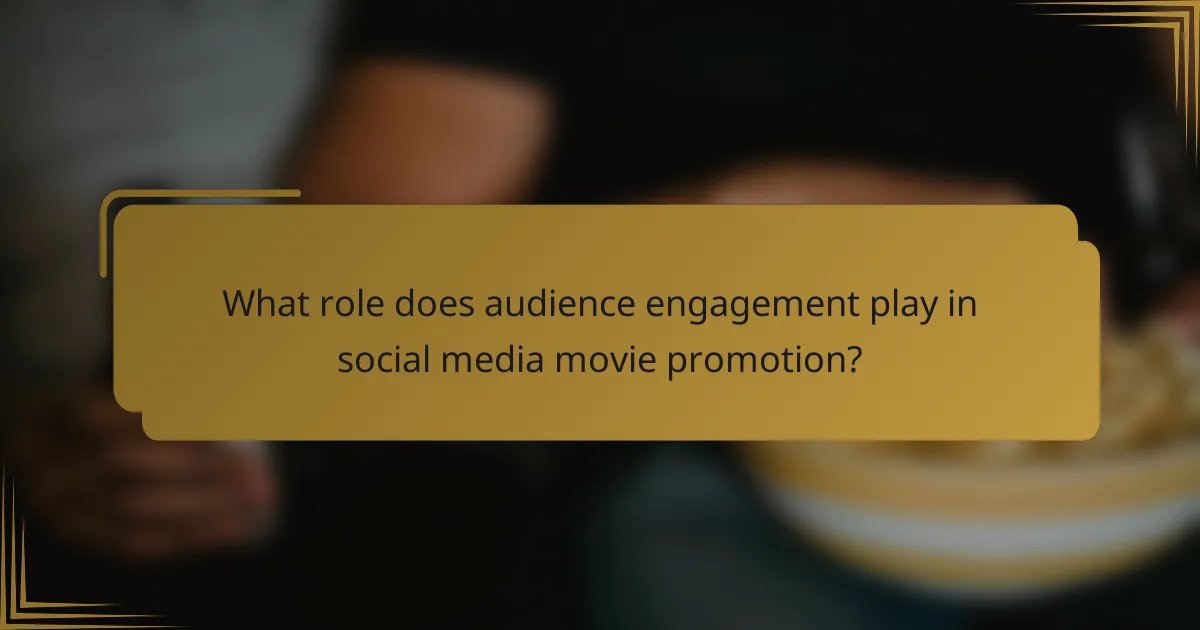
What role does audience engagement play in social media movie promotion?
Audience engagement is crucial in social media movie promotion. It helps build a community around the film. Engaged audiences are more likely to share content, increasing visibility. According to a study by the American Film Institute, films with higher social media engagement see up to 30% more ticket sales. Interactive content, such as polls and Q&A sessions, fosters deeper connections. These connections can lead to word-of-mouth promotion, which is vital for a film’s success. Engaging with fans also allows filmmakers to gather feedback, shaping future marketing strategies. Overall, audience engagement amplifies reach and enhances promotional efforts.
How can filmmakers build a community around their movie on social media?
Filmmakers can build a community around their movie on social media by actively engaging with their audience. They should create dedicated social media profiles for the film. This allows for focused content sharing and interaction. Posting behind-the-scenes content fosters a connection with fans. Regular updates about production progress keep the audience informed and invested. Filmmakers can also host live Q&A sessions to interact directly with fans. Utilizing hashtags specific to the film encourages user-generated content. Collaborating with influencers can expand reach and attract new followers. Engaging with comments and messages shows appreciation for the audience. These strategies help create a loyal community around the film.
What strategies can be used to encourage audience interaction?
To encourage audience interaction, utilize strategies such as engaging content, polls, and Q&A sessions. Engaging content includes eye-catching visuals and compelling storytelling. Polls invite audience participation and provide insights into preferences. Q&A sessions allow direct interaction and address audience questions. Contests and giveaways incentivize participation and sharing. Consistent responses to comments foster a sense of community. Live streaming events create real-time engagement opportunities. These strategies have been shown to increase audience involvement and build loyalty.
How can user-generated content enhance movie promotion?
User-generated content enhances movie promotion by increasing audience engagement and authenticity. It allows fans to share their experiences and opinions, creating a sense of community. This content often feels more relatable than traditional marketing. According to a study by Nielsen, 92% of consumers trust user-generated content more than brand messages. Additionally, user-generated content can lead to organic reach on social media platforms. It encourages sharing among peer networks, amplifying promotional efforts. By showcasing fan creativity, movies can build stronger connections with their audience. This approach can result in higher ticket sales and increased brand loyalty.
What metrics should be tracked to measure the success of social media strategies?
Key metrics to track for measuring social media strategy success include engagement rate, reach, and conversion rate. Engagement rate reflects how users interact with content, indicating its effectiveness. Reach measures the total number of unique users who see the content. Conversion rate tracks the percentage of users who take a desired action, such as visiting a website or purchasing a ticket.
Additionally, tracking follower growth shows audience expansion over time. Impressions indicate how often content is displayed, regardless of clicks. Click-through rate (CTR) reveals the effectiveness of calls to action. Lastly, sentiment analysis gauges audience perception and feedback. These metrics provide a comprehensive view of social media performance and effectiveness in movie promotion.
Which key performance indicators (KPIs) are most relevant for movie promotion?
The most relevant key performance indicators (KPIs) for movie promotion include social media engagement, ticket sales, and audience reach. Social media engagement measures likes, shares, and comments on promotional content. This reflects audience interest and interaction. Ticket sales track the financial success of the movie. Increased sales indicate effective promotional strategies. Audience reach quantifies the number of individuals exposed to marketing materials. High reach can lead to greater awareness and interest. Other important KPIs include website traffic and conversion rates. Website traffic indicates how many users visit the movie’s promotional site. Conversion rates measure the percentage of visitors who purchase tickets. These KPIs collectively provide a comprehensive view of the promotional effectiveness for movies.
How can analytics inform future social media strategies?
Analytics can inform future social media strategies by providing insights into audience behavior and engagement. By analyzing metrics such as likes, shares, comments, and reach, marketers can identify which types of content resonate most with their audience. For instance, a study by Hootsuite found that posts with videos generate 48% more engagement than images. This data allows brands to tailor their content strategy accordingly. Additionally, analytics can reveal peak engagement times, enabling brands to schedule posts for maximum visibility. Monitoring demographic data helps in understanding audience preferences and targeting specific segments effectively. Overall, leveraging analytics leads to more informed decisions that enhance social media performance.
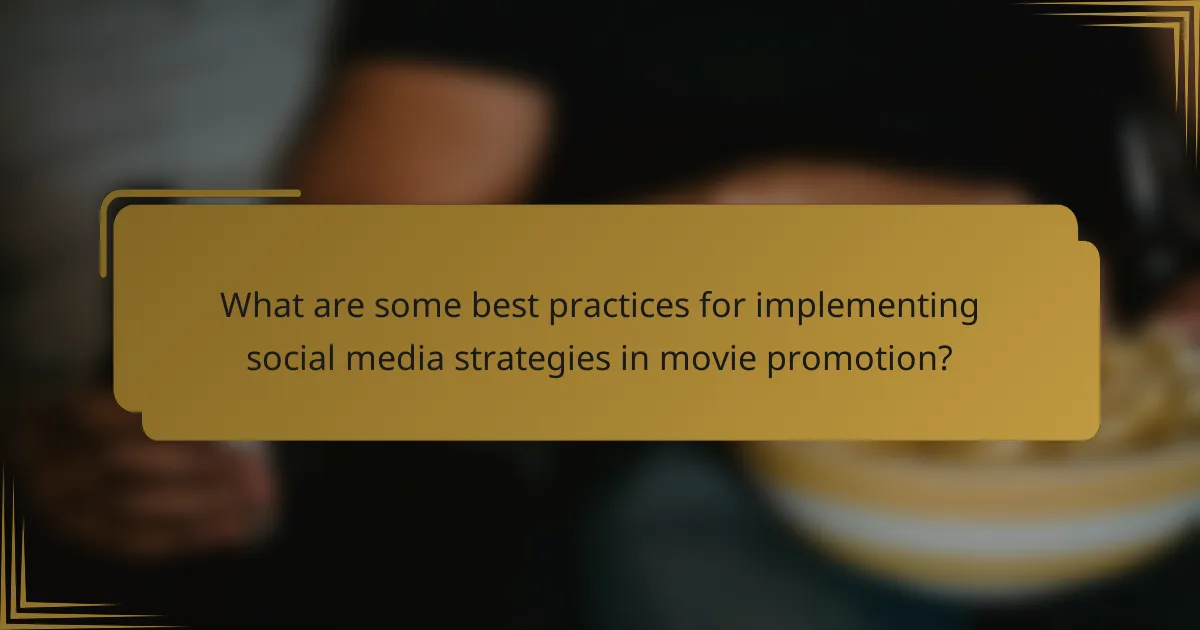
What are some best practices for implementing social media strategies in movie promotion?
Engaging with the audience is crucial for effective social media strategies in movie promotion. Create interactive content such as polls and quizzes to encourage participation. Utilize visually appealing graphics and trailers to capture attention. Consistent posting keeps the audience informed and engaged. Collaborate with influencers to reach wider audiences and build credibility. Use targeted ads to reach specific demographics, maximizing promotional impact. Monitor analytics to assess engagement and adjust strategies accordingly. These practices enhance visibility and interest in the movie, driving ticket sales and audience attendance.
How can movie marketers effectively schedule and plan their content?
Movie marketers can effectively schedule and plan their content by utilizing a strategic content calendar. This calendar outlines key dates, including release dates and promotional events. It helps to coordinate social media posts, trailers, and other marketing materials. Marketers should analyze audience engagement data to determine optimal posting times. They can also leverage trending topics and seasonal events to maximize visibility. Consistent messaging across platforms enhances brand recognition. Tools like Hootsuite or Buffer can streamline scheduling and monitoring. Research indicates that well-planned campaigns can increase audience reach by up to 30%.
What tools can assist in managing social media campaigns?
Social media management tools can assist in managing social media campaigns. These tools streamline content scheduling, analytics, and engagement. Popular options include Hootsuite, Buffer, and Sprout Social. Hootsuite allows users to manage multiple accounts from one dashboard. Buffer offers scheduling and analytics features for optimal posting times. Sprout Social provides in-depth reporting to track campaign performance. According to a 2021 report by HubSpot, 73% of marketers found social media management tools effective for campaign success.
How often should content be posted to maintain audience interest?
Content should be posted at least three to five times per week to maintain audience interest. This frequency allows for consistent engagement without overwhelming followers. Research shows that brands posting daily can see a 50% increase in engagement. A study by HubSpot indicates that companies posting multiple times a week experience higher visibility and interaction rates. Additionally, maintaining a regular posting schedule helps to build anticipation among audiences. This strategy keeps the audience informed and engaged with ongoing updates and promotions.
What common challenges do filmmakers face in social media promotion?
Filmmakers face several common challenges in social media promotion. One major challenge is creating engaging content that resonates with audiences. Many filmmakers struggle to stand out in a crowded digital landscape. Limited budgets can restrict promotional efforts, making it hard to reach wider audiences. Additionally, filmmakers often lack expertise in digital marketing strategies. This can lead to ineffective campaigns that fail to generate buzz. Timeliness is another issue; filmmakers must promote their projects at the right moment to maximize impact. Finally, managing audience interactions and feedback can be overwhelming, especially for those new to social media. These challenges highlight the complexities filmmakers encounter in promoting their work online.
How can negative feedback be managed on social media platforms?
Negative feedback on social media platforms can be managed by responding promptly and professionally. Timely responses show that the brand values customer opinions. Acknowledge the issue raised in the feedback to demonstrate understanding. Offering solutions or alternatives can help mitigate the negativity. Encouraging private conversations can prevent public disputes and allow for more personalized responses. Monitoring social media channels regularly helps in identifying negative feedback early. Engaging positively with satisfied customers can balance the overall sentiment. Research indicates that 70% of consumers expect a response within an hour of reaching out on social media.
What strategies can help overcome budget constraints in social media marketing?
Utilizing organic content and community engagement can help overcome budget constraints in social media marketing. Creating high-quality, shareable content requires minimal financial investment. Engaging directly with the audience fosters loyalty and encourages word-of-mouth promotion. Collaborating with influencers can amplify reach without high costs. Using user-generated content also minimizes expenses while enhancing authenticity. Scheduling posts during peak engagement times maximizes visibility without additional spend. Analyzing performance metrics allows for strategic adjustments, optimizing resource allocation effectively. These strategies collectively enable impactful marketing within limited budgets.
What practical tips can enhance social media strategies for movie promotion?
Engaging content enhances social media strategies for movie promotion. Create visually appealing posts that showcase movie highlights. Use behind-the-scenes footage to generate interest. Leverage interactive content like polls and quizzes to engage the audience. Collaborate with influencers to reach wider audiences. Share user-generated content to build community and trust. Schedule posts during peak engagement times for maximum visibility. Analyze performance metrics to refine strategies based on audience response.
How can collaborations with influencers benefit movie promotion?
Collaborations with influencers can significantly enhance movie promotion. Influencers have established trust and credibility with their audience. This trust can lead to increased engagement and interest in the movie. According to a survey by Nielsen, 92% of consumers trust recommendations from individuals over brands. Influencers can create authentic content that resonates with their followers. This content can include reviews, behind-the-scenes looks, or exclusive interviews. Such personalized engagement can drive ticket sales and social media buzz. Additionally, influencers can reach niche audiences that traditional advertising may not effectively target. This targeted approach can maximize promotional efforts and improve overall campaign effectiveness.
What innovative tactics can be employed to stand out in a crowded market?
Utilizing interactive content is an innovative tactic to stand out in a crowded market. Interactive content engages audiences more effectively than static posts. For example, polls, quizzes, and live Q&A sessions can increase user participation. Personalized video messages can create a unique connection with the audience. Collaborating with influencers can amplify reach and credibility. Leveraging user-generated content fosters community and authenticity. Implementing augmented reality experiences can enhance viewer engagement. These tactics have been shown to improve brand visibility and audience retention.
Effective Social Media Strategies for Movie Promotion is centered around utilizing various platforms to enhance audience engagement and drive ticket sales. The article outlines key strategies such as targeted advertising, engaging content creation, and influencer partnerships, emphasizing the importance of demographic considerations in platform choice. It also discusses essential components of a successful social media strategy, including audience interaction, content variety, and the use of analytics to inform future campaigns. Additionally, the article highlights best practices for content scheduling and managing audience feedback to maximize promotional effectiveness.
